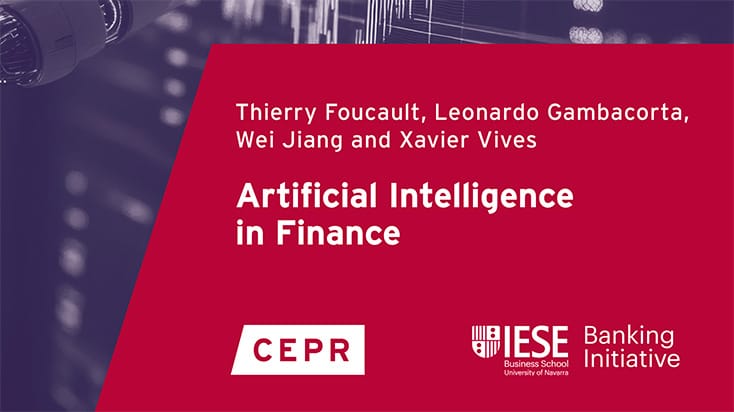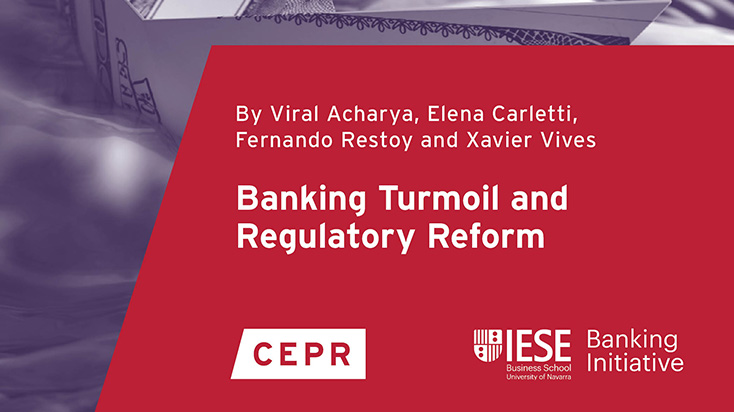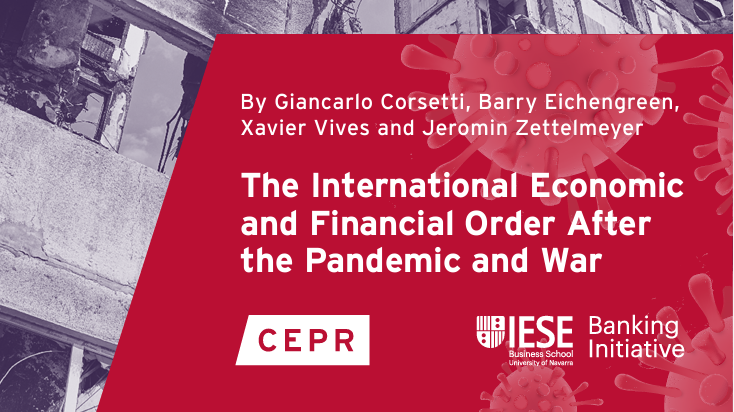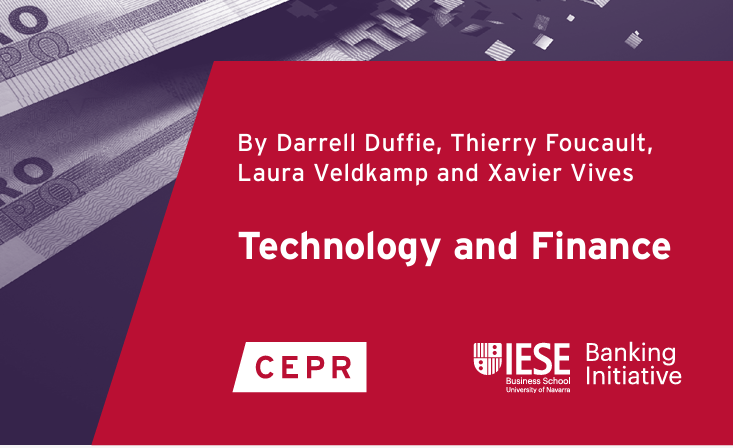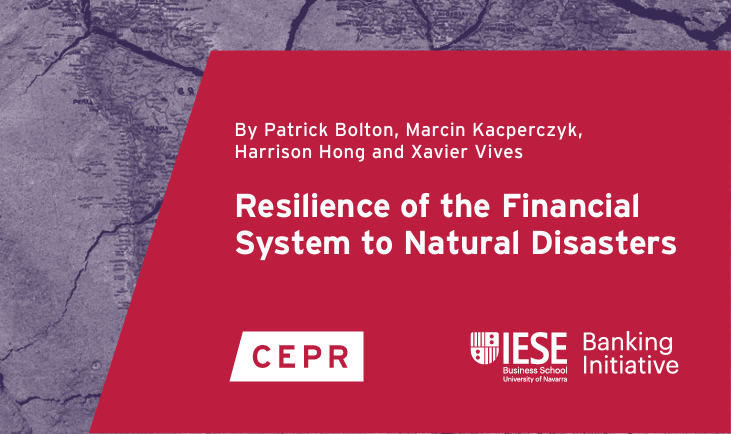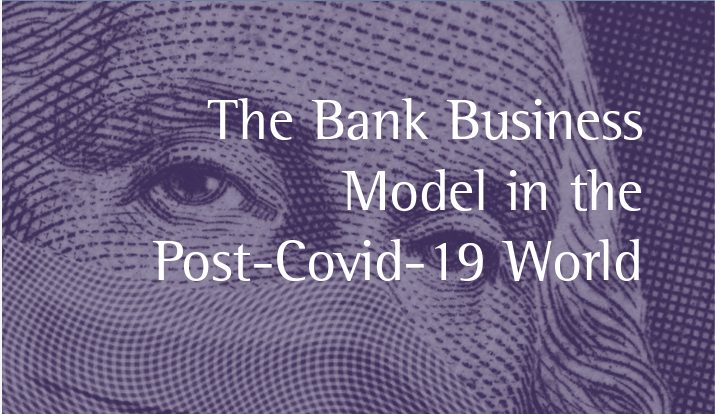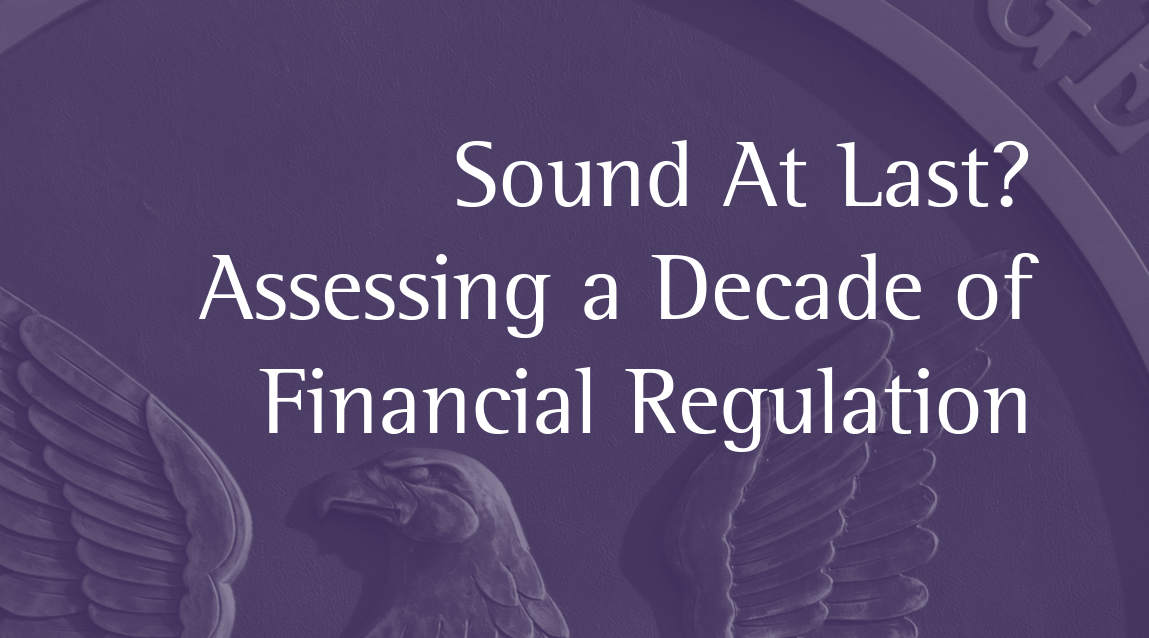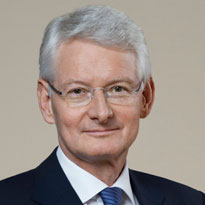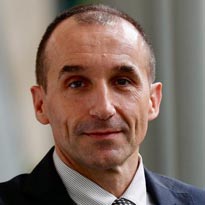Banking Initiative
Understanding the future of banking
The IESE Banking Initiative, with the support of Citi, wishes to study post-crises developments of banking and financial markets, paying particular attention to regulation and competition policy and the impact on business banking models. The initiative aims to promote a rigorous and informed dialogue on current issues in the fields of banking and financial markets among academics, regulators, companies and civil society.
The origin of the initiative lies in the annual Future of Banking Conference that IESE launched in London in 2014 to help improve research on the governance and management of banks.
With an initial horizon of four years, the program aims to be a reference point in banking and financial studies and will focus on issues that will be crucial to understanding the evolution of these sectors. Throughout the initiative, an annual report on the future of banking will be produced by a group of first-rate researchers.
The initiative is grateful for the support of:
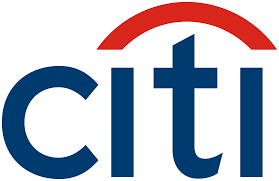
Reports.
How artificial intelligence is transforming finance, IESE Insight, 11/06/2025
Artificial intelligence in finance, VoxEU.org, 05/06/2025
Lessons and reforms for a fragile financial system, IESE Insight, 20/06/2024
Banking turmoil and regulatory reform, VoxEU.org, 7/06/2024
How pandemic and war are transforming global finance, IESE Insight, 09/06/2023
The international economic and financial order after the pandemic and war, VoxEU.org, 8/06/2023
Is SVB the Canary in the Coal Mine?, Project Syndicate, 14/03/2023
Crypto’s well-worn path to crisis, Project Syndicate, 2/12/2022
FTX collapse has historical parallels; will we learn from them?, PYMNTS, 30/11/2022
Sen Sherrod Brown seeks more cooperation on crypto regulation, PYMNTS, 30/11/2022
Inflation, dollar-dominance and debt levels: 3 big questions for economists now, IESE Insight, 23/11/2022
Winter is coming in Europe, IESE Insight, 25/08/2022
Locking the stablecoin door after the horse has spent all of the crypto on carrots and then vanished over the fence, Forbes, 30/05/2022
The impact of technology on finance, VoxEU.org, 27/05/2022
ECB executive board member talks about current state of digital euro CBDC research, CoinTelegraph, 8/04/2022
Was COP26 cheap talk?, Project Syndicate, 17/11/2021
How resilient is the financial system to natural disasters?, The Banker, 10/06/2021
New report: Improving the resilience of the financial system in response to natural disasters, IESE, 26/05/2021
VoxTalks: The financial system and climate change, VoxEU CEPR, 25/05/2021
Resilience of the financial system to natural disasters, VoxEU.org, 25/05/2021
Banking on resilience: Preparing our financial system to face natural disasters, IESE Insight, 24/05/2021
Can the financial system withstand pandemics and climate change?, IESE, 19/03/2021
European banking’s moment of merger truth, Project Syndicate, 2/12/2020
A stable euro requires an ambitious industrial policy, Project Syndicate, 4/09/2020
What will COVID-19 do to banking?, Xavier Vives, Project Syndicate, 9/07/2020
VoxTalks: Banks under pressure, VoxEU CEPR, 8/07/2020
The bank business model in the post-Covid-19 world, Elena Carletti, Stijn Claessens, Antonio Fatás & Xavier Vives, VoxEU.org, 18/06/2020
Better data on modern finance reveals uncomfortable truths, Financial Times, 10/10/2019
Política y bancos centrales, Xavier Vives, La Vanguardia, 25/07/2019
How to keep central banks independent, Patrick Bolton, Stephen Cecchetti, Jean-Pierre Danthine & Xavier Vives, Project Syndicate, 11/07/2019
How will banking look in 10 years’ time?, Xavier Vives, The Banker, 02/01/2019
“Free Entry in a Cournot Market with Overlapping Ownership”, Xavier Vives and Orestis Vravosinos, American Economic Journal-Microeconomics, 2025, 17, 2, 292-320.
“Fintech Entry, Lending Market Competition and Welfare” Xavier Vives & Zhiqiang Ye, Journal of Financial Economics, 2025, 168, 104040. (Best Paper Award in the Second School of Finance Alumni Forum at Renmin University of China). WP
“Zombie Credit and (Dis-)Inflation: Evidence from Europe”, Viral Acharya, Matteo Crosignani, Tim Eisert & Christian Eufinger, Journal of Finance, Vol. 79 (3), 2024, pp 1883-1929.
“Information Technology and Lender Competition“, Xavier Vives and Zhiqiang Ye, Journal of Financial Economics, 2025, 163, 103957. (Recipient of the SANFI award for the best paper on Banking on the 29th Finance Forum 2022).
“Stock Comovement and Financial Flexibility”, Teng Huang, Anil Kumar, Stefano Sacchetto & Carles Vergara-Alert, Journal of Financial and Quantitative Analysis, Vol. 59 (3), 2024, pp 1141-1184.
“How do Supply Shocks to Inflation Generalize? Evidence from the Pandemic Era in Europe”, Viral Acharya, Matteo Crosignani, Tim Eisert & Christian Eufinger, Working Paper, 2023.
“Concentrating on Bailouts: Government Guarantees and Bank Asset Composition”, Christian Eufinger, Juan Pablo Gorostiaga & Björn Richter, Working Paper, 2023.
“CBDC and Banks: Threats or Opportunity?”, Martina Fraschini, Luciano Somoza & Tammaro Terracciano, Working Paper, 2023.
“The Monetary Entanglement between CBDC and Central Bank Policies”, Martina Fraschini, Luciano Somoza & Tammaro Terracciano, Working Paper, 2023.
“The Crypto Cycle and US Monetary Policy”, Natasha Che, Alexander Copestake, Davide Furceri & Tammaro Terracciano, IMF Working Paper.
“Monetary Policy, Market Power and SMEs”, Annalisa Ferrando, Peter McAdam, Filippos Petroulakis & Xavier Vives, AEA Papers and Proceedings, Vol. 113, 2023, pp 105-109.
“Diamond and Dybvig meet money: Are deposit contracts efficient after all?”, David Rivero and Hugo Rodríguez, Working Paper, 2023.
“Open Banking: Promise and Trade-Offs”, David Rivero and Xavier Vives, European Economy, issue 2022, 45-56.
“Market Opacity and Fragility: Why liquidity evaporates when it is most needed”, Giovanni Cespa & Xavier Vives, Dec. 2023.
“Exchange Competition, Entry and Welfare” & Web appendix, Cespa, Giovanni & Vives, Xavier, The Review of Financial Studies, Vol. 35 (5), 2022, pp 2570-2624.
“Product Market Structure and Monetary Policy Evidence from the Euro Area”, Annalisa Ferrando, Peter McAdam, Filippos Petroulakis & Xavier Vives, 2021, Working Paper Series 2632, European Central Bank.
“(In)efficiency in Information Acquisition and Aggregation through Prices”, Alessandro Pavan, Savitar Sundaresan & Xavier Vives, Working Paper.
“Ownership Diversification and Product Market Pricing Incentives”, Albert Banal-Estañol, Jo Seldeslachts & Xavier Vives, Working Paper 2022.
“The antitrust FinTech challenge”, Xavier Vives, 2021, Concurrences, N° 4, 21-26.
“Diversification, Common Ownership, and Strategic Incentives”, Albert Banal-Estañol, Jo Seldeslachts & Xavier Vives, AEA Papers and Proceedings, Vol. 110, 2020, pp 561-564.
“Whatever it Takes: The Real Effects of Unconventional Monetary Policy”, Eufinger, Christian, Acharya, Viral V., Eisert, Tim & Hirsch, Christian, The Review of Financial Studies, Vol. 32(9), 2019, pp 3366-3411.
“Interbank Networks and Backdoor Bailouts: Benefiting from other Banks’ Government Guarantees”, Eufinger, Christian & Eisert, Tim, Management Science, Vol. 65(8), 2019, pp 3673-3693.
“Self-fulfilling Runs and Endogenous Liquidity Creation”, Rivero, David & Hugo Rodríguez, Journal of Financial Stability, Vol. 45, 2019, 100704.
“Digital Disruption in Banking”, Vives, Xavier, The Annual Review of Financial Economics, Vol 11, 2019, pp 243-272.
“Competition and Stability in Modern Banking: A Post-Crisis Perspective”, Vives, Xavier, International Journal of Industrial Organization, Vol. 64, 2019, pp 55-69.
“Competition Policy in Banking in the European Union”, Maudos, Joaquín & Vives, Xavier, Review of Industrial Organization, Vol. 55(1), 2019, pp 27-46.
VII Conference BI: Artificial Intelligence in Finance, 21/03/2025
Workshop on Artificial Intelligence in Finance, 20/03/2025
Workshop: IX Madbar, 25/10/2024
VI Conference BI: Banking Turmoil and Regulatory Reform, 19/04/2024
Workshop on Banking Turmoil and Regulatory Reform, 18/04/2024
Conference: ¿Hay alternativa al dólar?, 16/11/2023
V Conference BI: The Impact of the War on the International Economic and Financial Order, 30/03/2023
Session: The Impact of the War on the International Economic and Financial Order, 23/11/2022
Panel at the 49th European Finance Association Annual Meeting: The Financial Consequences of the War in Ukraine, 25/08/2022 Watch the session.
IV Conference BI: Technology and Finance, 8/04/2022
Webinar: Technology and Finance, 22/11/2021
Workshop: Technology and New Finance in the Digital Era, Luohan Academy, 25/05/2021
III Conference BI: Resilience of the Financial System to Natural Disasters, 17-18/03/2021
Webinar: Resilience of the Financial System to Natural Disasters, 23/11/2020
Workshop: V Madbar, 18/09/2020
II Conference BI: The Bank Business Model of the Future, 01/04/2020
Webinar: What Is the Bank Business Model Today?, 18/11/2019
Workshop: IV Madbar, 20/09/2019
I Conference BI: Sound at Last? Assessing a Decade of Financial Regulation, 22/03/2019
–> Conversation between professors Jaime Caruana and Xavier Vives
Presentation of the 7th report – IESE Barcelona, 29/07/2025
Presentation of the 7th report – Barcelona, 17/07/2025
Presentation of the 7th report – Barcelona, 10/06/2025
Presentation of the 6th report – IMF Washington, 30/10/2024
Presentation of the 6th report – PIIE Washington, 29/10/2024
Presentation of the 6th report – Brussels, 11/06/2024
Presentation of the 6th report – Barcelona, 6/06/2024
Presentation of the 6th report – Gothenburg, 3/06/2024
Presentation of the 5th report – Paris, 9/12/2023
Presentation of the 5th report – New York, 11/10/2023
Presentation of the 5th report – Barcelona, 13/06/2023
Presentation of the 4th report – Online, 8/06/2022
Presentation of the 3rd report – Online, 26/05/2021
Presentation of the 2nd Report – Hangzhou, 19/10/2020
Presentation of the 2nd Report – Online, 22/06/2020
Presentation of the 1st Report – New York, 16/10/2019
Presentation of the 1st Report – Beijing, 30/06/2019
Presentation of the 1st Report – Brussels, 20/06/2019
Presentation of the 1st Report – London, 06/06/2019
“Information Technology, Competition for Attention, and Corporate Efficiency”, Zhiqiang Ye, IESE, 5/09/2023
“Nonbank Fragility in Credit Markets: Evidence from a Two-Layer Asset Demand System”, Olivier Darmouni, Columbia University, 7/06/2023
“Survival of the Biggest: Large Banks and Financial Crises”, Matthew Baron, Cornell University, 15/05/2023
“The Debt-Inflation Channel of the German Hyperinflation”, Emil Verner, MIT, 24/04/2023
“Do Specialized Distress Investors Undermine Upstream Lending?”, Irem Denirci, Nova School of Business and Economics, 27/03/2023
“Climate risk, soft information, and credit supply”, Carles Vergara, IESE, 19/01/2023
“Market Opacity and Fragility”, Xavier Vives, IESE, 27/09/2022
“As strong as the weakest link: The impact of Misinformation in Social networks”, Manuel Mueller-Frank, IESE, 19/07/2022
“Art of Simple Multiproduct Auction Design”, Paul Klemperer, University of Oxford, 5/04/2022
“Fintech, Bank Branch Closings, and Mortgage Markets”, Josep Gisbert, Universitat Pompeu Fabra, 14/02/2022
“Monetary Policy and Inequality”, José Luis Peydró, Imperial College London & UPF, 9/11/2021
“Machine learning with test data in finance”, Stephen Hansen, Imperial College London, and Bryan Kelly, Yale School of Management, 19/01/2021
“Is financial globalization in reverse after 2008 Global Financial Crisis? Evidence from Corporate Valuations”, Andrew Karolyi, Cornell University, 15/12/2020
“Can the Covid Bailouts Save the Economy?”, Stijn Van Nieuwerburgh, Columbia Business School, 03/11/2020
“Scarring Body and Mind: The Long-Term Belief-Scarring Effects of COVID-19”, Laura Veldkamp, Columbia Business School, 15/10/2020
“Do Investors Care about Carbon Risk?”, Marcin Kacperczyk, Imperial College London, 15/10/2020
“Digital Disruption in Banking”, Xavier Vives, IESE, 22/09/2020
“Financial Markets, Common Ownership and Product Market Outcomes”, Albert Banal-Estañol, Universitat Pompeu Fabra, 29/10/2019
“Stress Testing and Bank Lending”, Joel Shapiro, Oxford University, 28/05/2019
“Becker Meets Kyle: Inside Insider Trading”, Marcin Kacperczyk, Imperial College London, 21/05/2019
“Financial Frictions, Foreign Currency Borrowing, and Systemic Risk”, Robert Marquez, UC Davis, 19/03/2019
“Network Hazard and Bailouts”, Selman Erol, Carnegie Mellon University, 12/03/2019
“The Economics of Sovereign Debt, Bailouts and the Eurozone Crisis”, Philippe Martin, SciencePo Paris, 18/12/2018
“Stressed Banks”, Diane Pierret, HEC Laussane, 27/11/2018
“10 Years after Lehman Brothers Fall”, Alumni Session, 30/10/2018
Advisory Council.
Advisory Council.
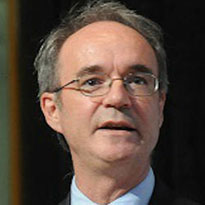
Patrick Bolton
Columbia University

Elena Carletti
Bocconi University

Linda Goldberg
Federal Reserve Bank of New York

Carmen Matutes
Waveform Investments

Andrew Pitt
Citi

Fernando Restoy
Bank for International Settlements

Hélène Rey
London Business School

Paola Sapienza
Kellogg School of Management
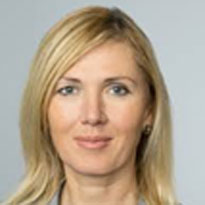
Beatrice Weder di Mauro
CEPR

Paco Ybarra
Citi
